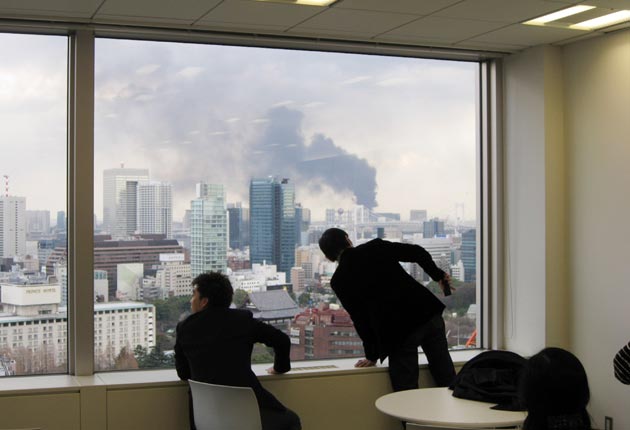They were the most terrifying two minutes of my entire life
Eyewitness

Everyone who lives in Tokyo has mentally rehearsed where they might be when the Big One strikes.
Inside a public park, a modern office or safely tucked up in bed underneath a sturdy roof are the preferred locations. Strolling around in one of the city's subterranean underground shopping districts or jostling for space in crowded old buildings are not. I found myself in the oldest section of creaking Shinagawa Station, one of Tokyo's busiest train hubs, with my heavily pregnant partner.
The quake began not with a jolt but with an almost lazy undulating rocking motion that slowly built in intensity until the station's roof rattled violently and glass fell onto the platform. A woman somewhere screamed, others clung to husbands, wives or children or ran for the exits. I watched one station attendant sprint back and forth across the platform, waving his hands in a blind panic and shouting at commuters to stay away from the tracks. We stood frozen to the spot, hearts thumping violently and watching the roof, praying it wouldn't fall on top of our heads.
As the shaking subsided and the terror of being buried beneath tons of steel and concrete faded, some people began crying. It had lasted two minutes. An almost palpable sense of relief filled the crowded station, like a single, giant sigh. Then everyone began pulling mobile phones out of bags and frantically calling family and friends to check if they were OK, crashing the network.
"That was terrifying," said one middle-aged woman. "I thought it was the end," said another.
Hundreds of people walked around on wobbly legs, dazed, their schedules knocked off kilter, the technology that cushions life in this giant metropolis rendered almost useless. Trains had stopped, phone networks were down, the power supply flickered on and off. On the streets as we walked the four miles toward the Foreign Correspondents' Club in Yurakucho, hundreds of office workers crowded outside buildings wearing candy-coloured safety helmets and glancing nervously toward the sky.
Fire engines and ambulances wailed; a siren sounded continuously from the local city office. Plumes of thick black smoke billowed from the direction of Tokyo Bay. Salarymen crowded around TVs in the upmarket Ginza district, shaking their heads and watching live reports of a tsunami washing away cars, houses and maybe towns on the Pacific coast a few hundred miles away.
The end of the world must look something like this, we told each other. But amid the apocalyptic scenes, dozens of people were already winding down, smoking nervously, sipping coffees in cafes and babbling to friends about what had happened.
Nobody could remember an earthquake like it, because there was nobody old enough. At the Foreign Correspondents' Club, my exhausted partner was given a hastily made-up bed to lie down on and I looked at her, carrying our half-Japanese son, and wondered how I would tell him about this day, and the most terrifying two minutes of my life.
Subscribe to Independent Premium to bookmark this article
Want to bookmark your favourite articles and stories to read or reference later? Start your Independent Premium subscription today.

Join our commenting forum
Join thought-provoking conversations, follow other Independent readers and see their replies